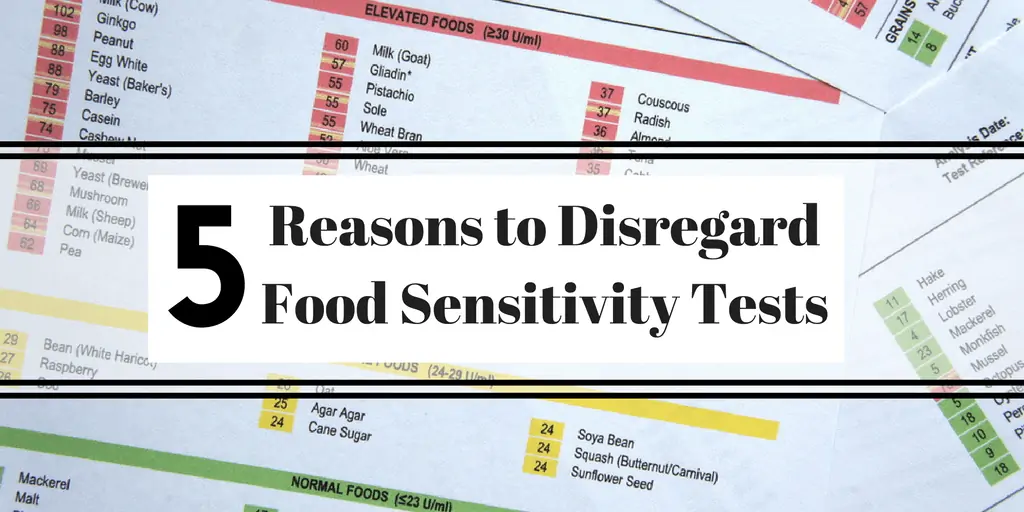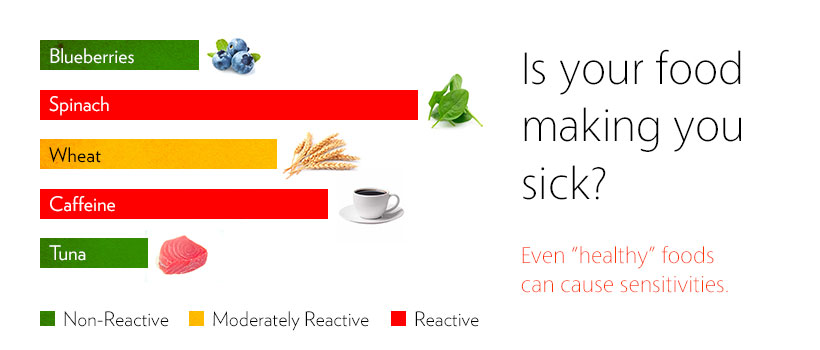
Five Reasons to Disregard Food Sensitivity Tests
For the past four years, I have wanted to request CBC Marketplace do an expose on the increasingly popular, “food sensitivity tests”. These blood tests cost around $500-$700 and screen over 250 different foods to determine which foods you are “sensitive” to. Awareness needs to be raised as millions of well-intentioned consumers are being swindled by claims that “hidden food sensitivities”, once eliminated, will “supposedly” rid our bodies of various health ailments such as digestive disorders, headaches, chronic pain and even weight issues.
Today, I will highlight my top five concerns with these pseudoscience food tests and why they should be disregarded. Please share this blog with your friends and family and reach out to Marketplace to request the same segment!
Before jumping in, it is vital that we first make something very clear: food allergies are NOT the same thing as food intolerances! You may be lactose intolerant but this does not mean that you have a milk allergy.
Food Allergy | Food Intolerance | |
| Definition | Immune- system response that can be fatal. | Not immune-related; broad term to describe foods that your body has a difficult time tolerating at varying amounts. |
| Examples | Peanut, milk, egg allergy, etc. | Lactose Intolerance should limit their lactose intake. Those with digestive concerns might like to try a dietitian-assisted Low FODMAP diet. |
| Diagnosis | An allergist (Clinical immunologist, medical doctor) will take a medical history and perform skin test for IgE antibodies. | No blood test is validated for diagnosis of food intolerance.May use food-symptom diary, elimination diet, or breath hydrogen tests for lactose intolerance. |
Five Reasons to Disregard Food Sensitivity Tests:
Find out my top five concerns with these food sensitivity tests and why they should be disregarded Share on X1. IgG Test Lack Clinical Validity:
When our bodies are exposed to foods, there are different antibodies (proteins made by the immune system) that get produced. There are a total of five different subclasses of antibodies and they have different functions and locations in the body.
If your body produces IgE antibodies to a certain food, you can have an allergic response. For example, if Joe has a peanut allergy, he would have IgE antibodies in response to peanut protein and immediate symptoms may include: hives, vomiting, wheezing or a sudden decrease in his blood pressure. IgE food allergy tests are clinically validated for diagnosing food allergies. Not all food allergies are IgE mediated, but this gets more specific than the scope of this article.
However, food sensitivity tests look for a positive IgG antibody and classify this as a “food sensitivity.” The problem is the IgG antibody is the most abundant antibody in the body and is not clinically validated for diagnosing food sensitivity! In fact, countless studies have shown that IgG antibodies will be positive based on food exposure (here, here, here). Therefore, there will be many “false” IgG positive results in response to foods you are already eating. Having a positive IgG response to certain foods does not mean that your body is reacting negatively against this food, instead, it demonstrates tolerance. For example, children with true food allergies (IgE mediated allergies) are more LIKELY to have a tolerance to foods where they have increasing IgG antibodies (here, here). Similarly, immunotherapy or giving small amounts of an allergen to build tolerance is associated with increasing IgG antibodies showing improved tolerance (here, here).
Check out the Canadian Society of Allergy and Clinical immunology review of IgG food sensitivity tests.
2. False Promises
These test exploit consumer trust; without solid research (even on the manufacture’s websites) to back up their innumerable claims. Well intentioned, health-conscious consumers can easily be misled into purchasing these pricey food sensitivity tests. After all, they are trusting the people advising them – alternative health practitioners, gym sales-people and even some pharmacies have these kits.
Check out here how Elisa Biotechnologies promotes the health benefits and how Hemocode System indicate that if you are “intolerant” to certain foods and continue to eat them, you can develop conditions like headaches, chronic pain and digestive disorders, fibromyalgia, psoriasis, acne, diarrhea and constipation. Here’s a consumer tip, when there is no research to support something, the company will often use testimonials or case studies in its place.
3. Lack of Symptom Improvement
With all the time and money spent on these tests, you would at least hope that you’d feel better. Nope! In this research study published in International Archives of Allergy and Immunology 62% of patients were IgG positive for a number of foods, mainly egg, milk, casein and wheat. However, none of the patients with IgG-positive testing showed adverse reactions, neither immediate nor delayed, to the corresponding food when tested in a blind, placebo-controlled trial.
Most of the time, people ate these foods without any tolerance concerns. Remember that the IgG blood marker is positive because your body has built a tolerance to this food. This research study also found no benefit for those with irritable bowel syndrome (IBS) using IgG tests.
4. Unnecessary Dietary Restriction
As a registered dietitian, I have seen many clients come in completely over-whelmed with their long list of “food sensitivities”. They literally do not know what to eat and have eliminated a lot of healthy foods from their diets. Similarly, many people who have had these tests have already stopped following them because of the high level of restriction and no change in how they feel. The most concerning however, are the children and people with serious medical conditions (kidney failure, cancer treatment) who have their diets severely restricted based upon IgG tests. These vulnerable people are susceptible to inadequate nutritional intake for healthy body functioning and managing existing health conditions.
5. Be Critical!
Health information and dietary advice is flying at consumers from all directions. But not all of this information is true or science-based and not everyone is a trusted authority. To avoid spending money on a blood test that will likely give you a 20-page list of “sensitivities”, speak with a trained medical professional when dealing with your health concerns. Book a consultation with an allergist if you believe you have an allergy or intolerance. Speak with a medical specialist for other health concerns. If you are experiencing digestive concerns like abdominal pain, bloating and change in bowel movements you might have foods you are intolerant to and may benefit from working with a dietitian who specializes in digestive nutrition. Working with a dietitian can help you discover foods of intolerance through an elimination and challenge process based on your symptoms.
My Marketplace Request:
- Send host into different alternative health clinics for a “food sensitivity” test; compare results and advice that is provided. As a Dietitians of Canada Spokesperson, I would be more than happy to speak on camera as a health and nutrition expert.
- Have the host try to eliminate all IgG positive foods and explore possible nutrient deficiencies. Host can also comment on any difference in how she feels. Explore how manageable this level of dietary restriction is for long-term sustainability.
- Have the blood test re-taken (at three or five clinics) after months of dietary restriction.
Bottom Line:
Marketplace, please do an expose on these food sensitivity tests to save consumers from wasting their money. These blood tests are expensive, invalidated, unreliable and are not to be used as a diagnosis tool. IgG antibodies are linked with food tolerance and unnecessary dietary restriction can place people at nutritional risk. Additionally, consumers need to know that IgG antibodies tests are not a remedy for curing all health ailments.





